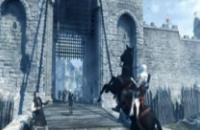| |
Assassin's
Creed (Continued)
During Altair's mission, he'll be able to explore three major cities in
his quest: Dasmascus, Jerusalem and, Acre. Each one has been rendered
based on archive material and are historically accurate, which helps to
increase your sense of immersion dramatically. As you explore, you'll see
many landmarks such as churches, courtyards and castles, each of which is
fully explorable and constructed to scale. The cities themselves offer a
vast terrain to explore and are impressive from both a visual and
architectural standpoint - bringing this historic era back to life in
brilliant form. There are hundreds of buildings in each city, and since
Altair can jump up and climb onto the roofs to scope out his surroundings,
there are definitely some quite impressive vistas. The game's graphic
engine is quite impressive, with an astonishing level of detail evident
throughout. Altair's movement and animation is smooth and concise, giving
his actions a deadly elegant grace that lends him an almost superhuman
feel at points. This is especially true during the sequences when he's
running through the streets after an escaping target, jumping off walls
and swinging through areas in his pursuit or while he's jumping over gaps
between buildings to evade capture, which makes these sequences even more
breathtaking and exciting. The gameplay does an excellent job of balancing
the more puzzle-oriented exploration and investigation sequences with
these intense, adrenaline pumping sequences which makes the experience all
the more gratifying.
 The
actions and situations you find yourself in might have made for an
unwieldy title, Assassin's Creed is a joy to play thanks to its intuitive
controls. Most actions you perform are context-sensitive, meaning that you
need only press a single button to perfom an action such as pick-pocketing
or attacking a foe. Each button has been mapped to specific actions and
are placed in such a way as to make them quickly become second nature.
Climbing is fairly simple, and only requires you to press the directional
pad up to continue. Likewise, you can jump across large gaps without much
effort. The combat system is a bit clunky at points, but is quite easy to
become accustomed to as well. This system makes the game a joy to play, so
any slips are usually your own fault. There are frequent save points as
well, which makes progression a lot easier than it could have been.
Unfortunately, there are some long load times between levels and when you
first begin the game, but this is relatively minor since once you're in
the game, things become almost seamless. The
actions and situations you find yourself in might have made for an
unwieldy title, Assassin's Creed is a joy to play thanks to its intuitive
controls. Most actions you perform are context-sensitive, meaning that you
need only press a single button to perfom an action such as pick-pocketing
or attacking a foe. Each button has been mapped to specific actions and
are placed in such a way as to make them quickly become second nature.
Climbing is fairly simple, and only requires you to press the directional
pad up to continue. Likewise, you can jump across large gaps without much
effort. The combat system is a bit clunky at points, but is quite easy to
become accustomed to as well. This system makes the game a joy to play, so
any slips are usually your own fault. There are frequent save points as
well, which makes progression a lot easier than it could have been.
Unfortunately, there are some long load times between levels and when you
first begin the game, but this is relatively minor since once you're in
the game, things become almost seamless.
While beautiful, Assassin's Creed's
cities aren't static museum pieces, and are instead full of life and
people. When you're exploring and investigating leads, you'll find
hundreds of unique characters crawling the streets. You'll find preachers,
beggars, soldiers, rich and poor in each city and how you interact with
them actually plays a large effect on how you're perceived. One of the
cooler things you can do in the game is to use your eagle vision, which
gives you a kind of heat-sensitive mode where you can see each character
painted in different colors, depending on their threat level. This is an
especially helpful technique to use when you need to pick a target out of
the crowd or need to find the location of an ally. If you choose to go
through the streets in low profile mode, you'll go largely undisturbed,
but you'll obviously go much slower. When Altair is in high-profile mode,
he moves much faster and can perform some pretty spectacular moves such as
jumping through the streets and towers. This means he'll draw a lot of
attention to himself, which can be a bad thing if he doesn't want to
become a target. Assassin's Creed's impressive crowd AI works fairly
accurately in relation to the events you create. For example, if you
become involved with the guards, the civilians nearby will begin to panic
and run away screaming. In another sequence, if you rush through an area
recklessly, the crowds will turn on you which will make your movements
slower while also tending to alert the nearby guards to the presence of
the hated assassin. This gives Assassin's Creed a very different feel from
most games on the market, and requires players to approach each mission
with a subtlety and sophistication than is usually demanded. In most
games, you're rewarded for blasting through, but you won't get very far if
you take this approach. Instead, you need to soak in the atmosphere,
retain information and look at the bigger picture while also keeping
focused on the seemingly tedious task at hand. It requires more commitment
than you'd expect, but Assassin's Creed rewards the intelligent player
with an unforgettable experience few other titles even try to achieve.
 The
easy path would be to pick things apart and dwell on the negatives, such
as the monotonous tower-climbing, the seemingly tedious information
gathering and its somewhat slow pace, but this would neglect what is a
very impressive accomplishment in the bigger picture. You can tell
immediately by looking at the muted, almost monochromatic color palette
that this isn't your typical action-adventure title. Assassin's Creed may
look slick and beautiful, but it isn't another mindless action game. There
are plenty of battles and confrontations but these sequences aren't the
main thrust of the game. Instead of taking the usual approach where
there's a perfunctory story designed to get you to the next battle, as is
usually the case, the battles in Assassin's Creed drive the story.
Understanding this unique difference in approach is essential to enjoying
an experience that is structured more like a mystery novel instead of a
traditional game. Here, the story unfolds at a deliberately slower pace in
order for the game's secrets to unfold. It's an effective approach that
helps to bring you deeper into the game. Instead of being merely mindless
vessels, the characters all bring with them unique personalities,
conflicting motivations and usually, unexpected secrets, some of which can
affect your entire perception of the game. There are several instances
where characters you think are basically evil become much less so, and
those who appear righteous become shadowed as things progress. It starts
off slowly, but as Assassin's Creed builds up its momentum, you can't help
but find yourself engrossed in its twisting storyline. There are many
unexpected layers and threads that appear, that we don't want to ruin, but
bring a dramatic change your character's perceptions that helps you
question everything you thought you knew. Its this kind of sophisticated,
intelligent approach that's been sorely lacking in many titles with
cinematic pretensions but becomes inherent in the structure of Assassin's
Creed. This isn't a perfect or flawless game by any means, but this is one
of the most ambitious, innovative and imaginative titles we've played in a
very long time. It delivers an excellent mix of exploration, action, and
drama that puts it several leagues above what you'd expect from an action
game, making it one of the year's most impressive releases. The
easy path would be to pick things apart and dwell on the negatives, such
as the monotonous tower-climbing, the seemingly tedious information
gathering and its somewhat slow pace, but this would neglect what is a
very impressive accomplishment in the bigger picture. You can tell
immediately by looking at the muted, almost monochromatic color palette
that this isn't your typical action-adventure title. Assassin's Creed may
look slick and beautiful, but it isn't another mindless action game. There
are plenty of battles and confrontations but these sequences aren't the
main thrust of the game. Instead of taking the usual approach where
there's a perfunctory story designed to get you to the next battle, as is
usually the case, the battles in Assassin's Creed drive the story.
Understanding this unique difference in approach is essential to enjoying
an experience that is structured more like a mystery novel instead of a
traditional game. Here, the story unfolds at a deliberately slower pace in
order for the game's secrets to unfold. It's an effective approach that
helps to bring you deeper into the game. Instead of being merely mindless
vessels, the characters all bring with them unique personalities,
conflicting motivations and usually, unexpected secrets, some of which can
affect your entire perception of the game. There are several instances
where characters you think are basically evil become much less so, and
those who appear righteous become shadowed as things progress. It starts
off slowly, but as Assassin's Creed builds up its momentum, you can't help
but find yourself engrossed in its twisting storyline. There are many
unexpected layers and threads that appear, that we don't want to ruin, but
bring a dramatic change your character's perceptions that helps you
question everything you thought you knew. Its this kind of sophisticated,
intelligent approach that's been sorely lacking in many titles with
cinematic pretensions but becomes inherent in the structure of Assassin's
Creed. This isn't a perfect or flawless game by any means, but this is one
of the most ambitious, innovative and imaginative titles we've played in a
very long time. It delivers an excellent mix of exploration, action, and
drama that puts it several leagues above what you'd expect from an action
game, making it one of the year's most impressive releases.
- Michael Palisano
Grade:
B+
|
| |
|

